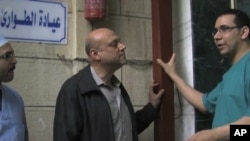The Muslim Brotherhood in Egypt is the country's best organized opposition group. Its members took part in the protests that swept Hosni Mubarak from power, but they did not dominate them. Instead, the brotherhood, still banned, works behind the scenes to win support and pave the way for what its leaders hope is the eventual imposition of Sharia law in the Arab world's most populous nation.
This is where the Muslim Brotherhood is winning hearts in Egypt.
El Farouk Hospital in suburban Cairo:
Like other facilities, it does not admit to receiving aid from the brotherhood, but the banned group directed VOA to this hospital.
Hospital Director Dr. Magdi Ahmed Abdel Aziz says the hospital serves everyone, especially the poor. “We get upper class people, especially in the emergency room. We get cases of poor people because our costs are subsidized with aid from donors,” Aziz said.
The hospital heals bodies, but it also provides for the spiritual needs of patients. This is why lawyer Ismail Mohamed Ismail had his surgery here.
“If you look behind you, the televisions are playing verses from the holy Quran. The staff are doing their jobs, considering God in their conscience and I feel comfortable and anything related to Islam makes me feel psychologically relieved,” Ismail said.
El Farouk and other Islamic donor-funded hospitals provide medical care for many poor Egyptians when government aid falls short.
“The health ministry provides care, but its budget cannot cover the services,” Aziz said.
The Muslim Brotherhood is not a jihadist organization. It wants gradual transformation. However, the group's former head, Mohamed Mahdi Akef, says its aim is clear. “Islam should rule Egypt,” he said.
Hosni Mubarak's departure and the prospect of free and fair elections may open a new opportunity for the group.
Muslim Brotherhood leaders hope the good will it has cultivated among some of Egypt's poor will bear fruit at election time, if the group is allowed to participate.
Patient Ismail Mohamed Ismail declines to say if he would vote for Brotherhood candidates. He is not sure if imposing Sharia in Egypt will ever be necessary.
“In the 70s, during the time of the late Presidents Nasser and Sadat, people were wearing short skirts, but their faith was stronger. Now, more people are wearing hijab but they are empty of faith. I hope people will have more faith, like before. I hope religion will come back to people, more than before,” Ismail said.
Banned from politics for decades, the Muslim Brotherhood has won ground in places like El Farouk Hospital. Its next challenge may be winning wider support across Egypt.















